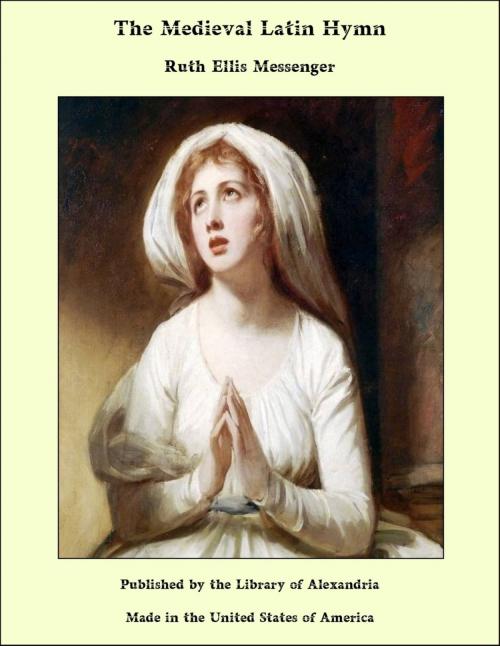| Author: | Ruth Ellis Messenger | ISBN: | 9781465614605 |
| Publisher: | Library of Alexandria | Publication: | March 8, 2015 |
| Imprint: | Language: | English |
| Author: | Ruth Ellis Messenger |
| ISBN: | 9781465614605 |
| Publisher: | Library of Alexandria |
| Publication: | March 8, 2015 |
| Imprint: | |
| Language: | English |
The first mention of Christian Latin hymns by a known author occurs in the writings of St. Jerome who states that Hilary, Bishop of Poitiers (c. 310-366), a noted author of commentaries and theological works, wrote a Liber Hymnorum. This collection has never been recovered in its entirety. Hilary’s priority as a hymn writer is attested by Isidore of Seville (d. 636) who says: Hilary, however, Bishop of Poitiers in Gaul, a man of unusual eloquence, was the first prominent hymn writer. More important than his prior claim is the motive which actuated him, the defense of the Trinitarian doctrine, to which he was aroused by his controversy with the Arians. A period of four years as an exile in Phrygia for which his theological opponents were responsible, made him familiar with the use of hymns in the oriental church to promote the Arian heresy. Hilary wrested a sword, so to speak, from his adversaries and carried to the west the hymn, now a weapon of the orthodox. His authentic extant hymns, three in number, must have been a part of the Liber Hymnorum. Ante saecula qui manens, “O Thou who dost exist before time,” is a hymn of seventy verses in honor of the Trinity; Fefellit saevam verbum factum te, caro, “The Incarnate Word hath deceived thee (Death)” is an Easter hymn; and Adae carnis gloriosae, “In the person of the Heavenly Adam” is a hymn on the theme of the temptation of Jesus. They are ponderous in style and expression and perhaps too lengthy for congregational use since they were destined to be superseded. In addition to these the hymn Hymnum dicat turba fratrum, “Let your hymn be sung, ye faithful,” has been most persistently associated with Hilary’s name. The earliest text occurs in a seventh century manuscript. It is a metrical version of the life of Jesus in seventy-four lines, written in the same meter as that of Adae carnis gloriosae.
The first mention of Christian Latin hymns by a known author occurs in the writings of St. Jerome who states that Hilary, Bishop of Poitiers (c. 310-366), a noted author of commentaries and theological works, wrote a Liber Hymnorum. This collection has never been recovered in its entirety. Hilary’s priority as a hymn writer is attested by Isidore of Seville (d. 636) who says: Hilary, however, Bishop of Poitiers in Gaul, a man of unusual eloquence, was the first prominent hymn writer. More important than his prior claim is the motive which actuated him, the defense of the Trinitarian doctrine, to which he was aroused by his controversy with the Arians. A period of four years as an exile in Phrygia for which his theological opponents were responsible, made him familiar with the use of hymns in the oriental church to promote the Arian heresy. Hilary wrested a sword, so to speak, from his adversaries and carried to the west the hymn, now a weapon of the orthodox. His authentic extant hymns, three in number, must have been a part of the Liber Hymnorum. Ante saecula qui manens, “O Thou who dost exist before time,” is a hymn of seventy verses in honor of the Trinity; Fefellit saevam verbum factum te, caro, “The Incarnate Word hath deceived thee (Death)” is an Easter hymn; and Adae carnis gloriosae, “In the person of the Heavenly Adam” is a hymn on the theme of the temptation of Jesus. They are ponderous in style and expression and perhaps too lengthy for congregational use since they were destined to be superseded. In addition to these the hymn Hymnum dicat turba fratrum, “Let your hymn be sung, ye faithful,” has been most persistently associated with Hilary’s name. The earliest text occurs in a seventh century manuscript. It is a metrical version of the life of Jesus in seventy-four lines, written in the same meter as that of Adae carnis gloriosae.















